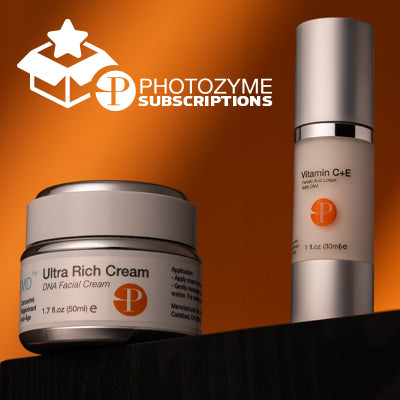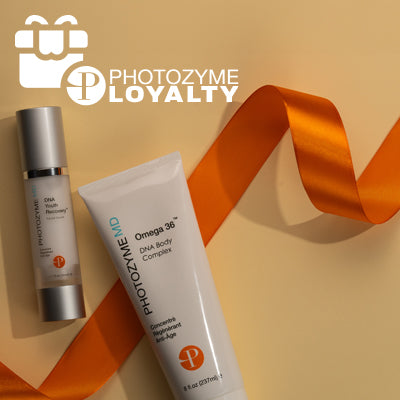
Key Takeaways:
- Omega-3 Fatty Acids Offer a Range of Health Benefits: When used in skin care, omega-3 fatty acids can improve the health and appearance of your skin, reduce skin issues, and aid in a clear complexion.
- Our Bodies Don’t Produce Omega-3 Fatty Acids: These polyunsaturated fats cannot be produced by the body itself, so they must be obtained through diet, supplements, or topical applications.
- Add Omega-3 to Your Diet and Skin Care Routine: Adding omega-3 fatty acids to your skincare routine and your diet can improve your skin from the inside out.
Omega-3 fatty acids have long been celebrated for their numerous health benefits, ranging from heart health to brain function. But did you know that these essential fatty acids can also work wonders for your skin? Incorporating omega-3s into your diet or skincare routine can lead to remarkable improvements in the health and appearance of your skin, giving you that radiant and youthful glow you've been longing for.
As a specialty skincare company committed to enhancing skin health, we at Photozyme have long recognized the potent benefits of omega-3 fatty acids for skin rejuvenation. Through our innovative and proprietary skincare products, we aim to harness the remarkable properties of omega-3s to deliver cutting-edge solutions to our customers.
In this article, we'll explore the transformative effects of omega-3 fatty acids on your skin, exploring how these powerful nutrients can help combat common skin issues and promote a clear, luminous complexion. Join us as we uncover the science behind omega-3 fatty acids and discover how incorporating them into your skincare regimen can revolutionize the way you care for your skin.
The Science Behind Omega-3 Fatty Acids
Omega-3 fatty acids are essential nutrients that play a crucial role in maintaining healthy skin. These polyunsaturated fats cannot be produced by the body itself, so they must be obtained through diet or supplements.
The key components of omega-3 fatty acids that benefit the skin are EPA (eicosapentaenoic acid) and DHA (docosahexaenoic acid). EPA is known for its anti-inflammatory properties, which can help reduce redness, swelling, and inflammation in the skin. Inflammation is a common cause of various skin issues, such as acne, eczema, and psoriasis. By incorporating omega-3 fatty acids into your diet, you may help alleviate these skin conditions.
DHA, on the other hand, is crucial for maintaining the integrity of the skin barrier. The skin barrier acts as a protective shield that prevents moisture loss and shields the skin from environmental stressors like UV radiation and pollution. A compromised skin barrier can lead to dryness, irritation, and accelerated aging. By consuming omega-3 fatty acids, you can support the health of your skin barrier and improve its function.
While ALA is not as potent as EPA and DHA, it is still a valuable omega-3 fatty acid that the body can convert into EPA and DHA to some extent. Plant-based sources of ALA include flaxseeds, chia seeds, walnuts, and hemp seeds, making them excellent options for vegetarians and vegans.
Moreover, omega-3 fatty acids also contribute to the hydration of the skin. These fats help maintain the skin's natural oil production, preventing it from becoming too dry or oily. Proper hydration is essential for plump, supple, and youthful-looking skin.
In conclusion, the science behind omega-3 fatty acids showcases their diverse benefits for skin health. From reducing inflammation and supporting the skin barrier to enhancing hydration, incorporating omega-3 fatty acids into your skincare routine can lead to a healthier and more radiant complexion.
Enhancing Hydration: Omega-3’s Role in Skin Moisture
Omega-3 fatty acids are not only beneficial for overall health but also play a crucial role in enhancing skin hydration. The skin's outermost layer, the epidermis, acts as a barrier to prevent water loss and protect against environmental aggressors. Omega-3 fatty acids support this barrier function by helping to maintain the skin's natural lipid barrier.
One of the key components of omega-3 fatty acids is docosahexaenoic acid (DHA), which is known for its ability to support skin hydration. DHA helps to strengthen cell membranes, allowing them to retain more moisture and stay hydrated. By improving the skin's moisture retention capacity, omega-3 fatty acids contribute to a plump, supple, and hydrated complexion.
In addition to enhancing hydration, omega-3 fatty acids also possess anti-inflammatory properties that can benefit various skin conditions. Inflammatory skin conditions like acne, eczema, and psoriasis can disrupt the skin barrier and lead to increased water loss. Omega-3 fatty acids help to reduce inflammation in the skin, promoting a healthier skin barrier and improving overall hydration levels.
Including omega-3-rich foods in your diet, such as fatty fish like salmon, mackerel, and sardines, can provide your skin with the essential nutrients it needs to maintain optimal hydration levels. Alternatively, incorporating a skincare product enriched with omega-3 fatty acids can directly nourish the skin and support its hydration needs.
By incorporating omega-3 fatty acids into your skincare routine, whether through diet or topical products, you can help enhance your skin's hydration levels, improve its barrier function, and achieve a radiant and healthy complexion.
Combating Aging: The Anti-Wrinkle Properties of Omega-3
As we age, our skin naturally undergoes changes due to a decrease in collagen production and exposure to environmental factors that can contribute to the formation of wrinkles. However, incorporating omega-3 fatty acids into your skincare routine can help combat and reduce the signs of aging, including the formation of wrinkles.
Omega-3 fatty acids have been shown to possess powerful anti-inflammatory properties, which can help reduce inflammation in the skin that contributes to the aging process. By reducing inflammation, omega-3 fatty acids can help minimize the appearance of fine lines and wrinkles, giving the skin a smoother and more youthful appearance.
Additionally, omega-3 fatty acids play a crucial role in maintaining the skin's natural moisture barrier. A well-hydrated skin barrier is essential for preventing dryness and maintaining skin elasticity, ultimately reducing the formation of wrinkles.
Moreover, omega-3 fatty acids have been linked to boosting skin cell regeneration and overall skin health. By promoting cell turnover, omega-3 fatty acids can help improve the skin's texture and tone, reducing the visibility of wrinkles and other signs of aging.
Incorporating omega-3-rich foods into your diet, such as fatty fish like salmon, flaxseeds, and walnuts, can not only benefit your overall health but also contribute to healthier and more youthful-looking skin. Additionally, using skincare products formulated with omega-3 fatty acids can provide targeted treatment for wrinkles and other aging concerns, helping you achieve a more radiant and youthful complexion.
By harnessing the anti-wrinkle properties of omega-3 fatty acids, you can effectively combat the visible signs of aging and maintain a youthful glow for years to come.
Why DNA Repair MattersAlso known as photodamage, the skin’s DNA is very susceptible to damage from UV light. Avoid the consequences of UV exposure. 80% of skin aging is due to the sun and no sunscreen is 100% effective. Your skin’s DNA is subject to daily environmental assaults accelerating skin aging. Your body can only process and repair about 50% of this damage in any given day. However, your skin is not defenseless against this damage.
Where Photozyme Comes InThanks to our DNA Enzyme Technology, our products utilize a targeted delivery of natural repair enzymes to help prevent the signs of skin aging from surfacing. These enzymes are:
Why Sunscreen Is Not EnoughBelow you will see a bar chart referencing why sunscreen is simply not enough. Researchers intended to study the exposure of human skin to ultraviolet radiation (UVR). UVR exposure results in the formation of DNA photolesions which eventually give rise to photoaging, mutations, cell death, and even carcinogenic events. However, when a DNA repair enzyme, such as photolyase, is introduced it works to reverse damage caused by that UVR exposure. The intention was to investigate if the addition of photolyase works to enhance the protection of sunscreen. After testing, they found that photolyase with the addition of sunscreen was superior to only using sunscreen alone. The major finding (shown below) gives weight to the thinking that photolyase is a helpful addition to your skincare routine. This may make a world of difference as we all work to prevent UVR-induced DNA damage.

Reference: Berardesca E, Bertona M, Altabas K, Altabas V, Emanuele E. Reduced ultraviolet-induced DNA damage and apoptosis in human skin with topical application of a photolyase-containing DNA repair enzyme cream: clues to skin cancer prevention. Mol Med Rep. 2012 Feb;5(2):570-4. doi: 10.3892/mmr.2011.673. Epub 2011 Nov 11. PMID: 22086236. |
Omega-3s and Acne Reduction
Acne is a common skin condition that can be distressing and challenging to manage. Research suggests that incorporating omega-3 fatty acids into your diet and skin care routine can help reduce the severity of acne breakouts.
Omega-3s have anti-inflammatory properties that can help calm the skin and reduce redness and swelling associated with acne. By lowering inflammation levels, omega-3s may also decrease the production of sebum, the oily substance that can clog pores and lead to acne formation.
Furthermore, omega-3 fatty acids play a crucial role in maintaining the skin's natural moisture barrier. Adequate levels of omega-3s can help keep the skin hydrated and balanced, preventing excessive dryness that can trigger acne flare-ups.
Incorporating foods rich in omega-3s, such as fatty fish like salmon, walnuts, flaxseeds, and chia seeds, into your diet can be beneficial for promoting clear, healthy skin from the inside out.
In addition to dietary sources, omega-3 supplements are available for those who may have difficulty getting enough of these essential fatty acids through food alone. Consult with a healthcare provider or dermatologist to determine the best approach for incorporating omega-3 supplements into your skincare routine for managing acne.
By harnessing the power of omega-3 fatty acids to reduce inflammation, regulate sebum production, and support skin hydration, you can take proactive steps to combat acne and promote a clearer complexion.
Eczema and Psoriasis: Easing Symptoms with Omega-3
Patients dealing with skin conditions like eczema and psoriasis often face challenges in managing their symptoms. These conditions can cause dryness, irritation, redness, and inflammation, leading to discomfort and self-consciousness.
Omega-3 fatty acids have shown promise in helping alleviate the symptoms associated with eczema and psoriasis. Studies suggest that omega-3s can help reduce inflammation in the body, which is a key factor in both conditions. By incorporating foods rich in omega-3s as well as skin care products containing omega-3s, individuals may experience improvements in their skin health.
One of the ways omega-3s benefit those with eczema and psoriasis is by helping to maintain the skin's natural moisture barrier. This barrier is essential for protecting the skin from external irritants and locking in hydration. Omega-3 fatty acids contribute to this by supporting skin cell membranes, which can lead to softer, more supple skin.
Moreover, the anti-inflammatory properties of omega-3s can help reduce redness and itching associated with eczema and psoriasis flare-ups. By potentially calming the immune response in the body, omega-3s may aid in minimizing the severity and frequency of these symptoms, providing relief to individuals struggling with these skin conditions.
While more research is needed to fully understand the impact of omega-3 fatty acids on eczema and psoriasis, current findings show promise in utilizing these essential nutrients as part of a holistic approach to managing these skin conditions. Incorporating omega-3-rich foods or supplements into a balanced diet and utilizing skin care products containing omega-3s may offer individuals with eczema and psoriasis a natural and complementary way to support their skin health.
The Protective Shield: Omega-3s Against Sun Damage
Omega-3 fatty acids have been revered for their ability to act as a protective shield against sun damage. Exposure to the sun's harmful UV rays can lead to premature aging, sunburns, and an increased risk of skin cancer. However, incorporating omega-3s into your skincare routine can help safeguard your skin from these detrimental effects.
Research has shown that omega-3 fatty acids have anti-inflammatory properties, which can help reduce redness, swelling, and irritation caused by sun exposure. By combating inflammation, omega-3s assist in maintaining the skin's barrier function, preventing sun damage from penetrating deep into the skin layers.
Moreover, omega-3s contribute to the skin's natural hydration and moisture retention. This is crucial for protecting the skin against dehydration caused by prolonged sun exposure, helping to maintain skin elasticity and suppleness.
In addition to their protective benefits, omega-3 fatty acids play a role in promoting skin repair and regeneration. When the skin is damaged by the sun, omega-3s support the healing process by stimulating cell turnover and collagen production. This helps in repairing the skin's DNA and minimizing the visible signs of sun damage, such as wrinkles and hyperpigmentation.
To fully harness the protective shield of omega-3s against sun damage, consider incorporating them into your diet through foods like fatty fish, chia seeds, flaxseeds, and walnuts. Supplementing with omega-3 capsules can also provide an extra boost for your skin's defense mechanisms.
By making omega-3 fatty acids a staple in your skincare routine, you can fortify your skin's defenses against sun damage and maintain a healthy, radiant complexion for years to come.
Final Thoughts
In conclusion, the benefits of omega-3 fatty acids for skin health are truly remarkable. By incorporating these essential nutrients into your diet or skincare routine, you can experience a transformation in the overall health and appearance of your skin. From reducing inflammation and oxidative stress to improving hydration and elasticity, omega-3s play a crucial role in maintaining radiant and youthful skin.
Whether consumed through diet or applied topically, omega-3 fatty acids offer a range of benefits that can help address various skin concerns, including dryness, acne, eczema, and premature aging. As a potent anti-inflammatory agent, omega-3s can calm redness and irritation, promoting a more even skin tone and texture.
When seeking skincare products enriched with omega-3 fatty acids, it is essential to choose high-quality formulations from reputable brands like Photozyme. With a focus on innovative and proprietary skincare solutions, Photozyme offers cutting-edge products that are designed to enhance and maintain skin health, making them an ideal choice for professionals in the aesthetic industry.
Incorporating omega-3 fatty acids into your skincare regimen is a simple yet effective way to nourish your skin from the inside out. By harnessing the power of these essential nutrients, you can achieve glowing, healthy skin that radiates beauty and vitality. So why wait? Start reaping the benefits of omega-3s today and embark on a journey towards vibrant and rejuvenated skin.
Read also:
- UNLOCK YOUTHFUL GLOW WITH SKIN ANTI-AGING STRATEGIES
- PHOTOZYME GFS PLUS NIGHT SERUM WITH PENN SMITH
- DOES BLUE LIGHT CAUSE DNA DAMAGE?
Frequently Asked Questions on the Benefits of Omega-3 Fatty Acids for Skin Health
How do omega-3 fatty acids benefit the skin?
Omega-3 fatty acids, particularly EPA and DHA, play a crucial role in skin health. They help maintain the skin’s lipid barrier, crucial in hydration and protection against environmental damage. Omega-3s also possess anti-inflammatory properties that can help reduce the symptoms of conditions like psoriasis and eczema.
What are the best sources of omega-3 for skin health?
The best dietary sources of omega-3 fatty acids include fatty fish such as salmon, mackerel, and sardines. Plant-based sources like flaxseeds, chia seeds, and walnuts, although higher in ALA (a precursor to EPA and DHA), also contribute to omega-3 intake. For those looking to directly impact skin health, high-quality supplements may also be an effective source.
Can omega-3 fatty acids reduce wrinkles?
Yes, omega-3 fatty acids can help in reducing the appearance of wrinkles. Their ability to preserve the skin’s natural oil barrier aids in hydration, which can plump the skin and reduce the visibility of fine lines and wrinkles. Moreover, the anti-inflammatory effects can also help combat skin aging by protecting against sun damage and environmental pollutants.
How does omega-3 combat skin dryness?
Omega-3 fatty acids strengthen the skin's lipid barrier, enhancing its ability to retain moisture. This improved barrier function prevents water loss, keeping the skin hydrated and combating dryness. Regular intake of omega-3s can lead to noticeable improvements in skin texture and hydration levels.
Is Omega-3 effective in treating acne?
Omega-3 fatty acids have anti-inflammatory properties that can help regulate skin inflammation, a significant factor in acne development. By reducing inflammation and potentially regulating sebum production, omega-3s can help in the management and reduction of acne.
Can topical omega-3 products improve skin texture?
Topical omega-3 products can significantly improve skin texture by providing the skin with essential fatty acids directly where they are needed. These products can help to fortify the skin’s lipid barrier, improving moisture retention and elasticity, resulting in smoother, more resilient skin.
Sources:
- Berardesca E, Bertona M, Altabas K, Altabas V, Emanuele E. Reduced ultraviolet-induced DNA damage and apoptosis in human skin with topical application of a photolyase-containing DNA repair enzyme cream: clues to skin cancer prevention. Mol Med Rep. 2012 Feb;5(2):570-4. doi: 10.3892/mmr.2011.673. Epub 2011 Nov 11. PMID: 22086236.
- Spencer JM, Morgan MB, Trapp KM, Moon SD. Topical formulation engendered alteration in p53 and cyclobutane pyrimidine dimer expression in chronic photodamaged patients. J Drugs Dermatol. 2013 Mar;12(3):336-40. PMID: 23545918.
- Carducci M, Pavone PS, De Marco G, Lovati S, Altabas V, Altabas K, Emanuele E. Comparative Effects of Sunscreens Alone vs Sunscreens Plus DNA Repair Enzymes in Patients With Actinic Keratosis: Clinical and Molecular Findings from a 6-Month, Randomized, Clinical Study. J Drugs Dermatol. 2015 Sep;14(9):986-90. PMID: 26355618.
- Mayoral FA, Kenner JR, Draelos ZD. The skin health and beauty pyramid: a clinically based guide to selecting topical skincare products. J Drugs Dermatol. 2014 Apr;13(4):414-21. PMID: 24719060.




